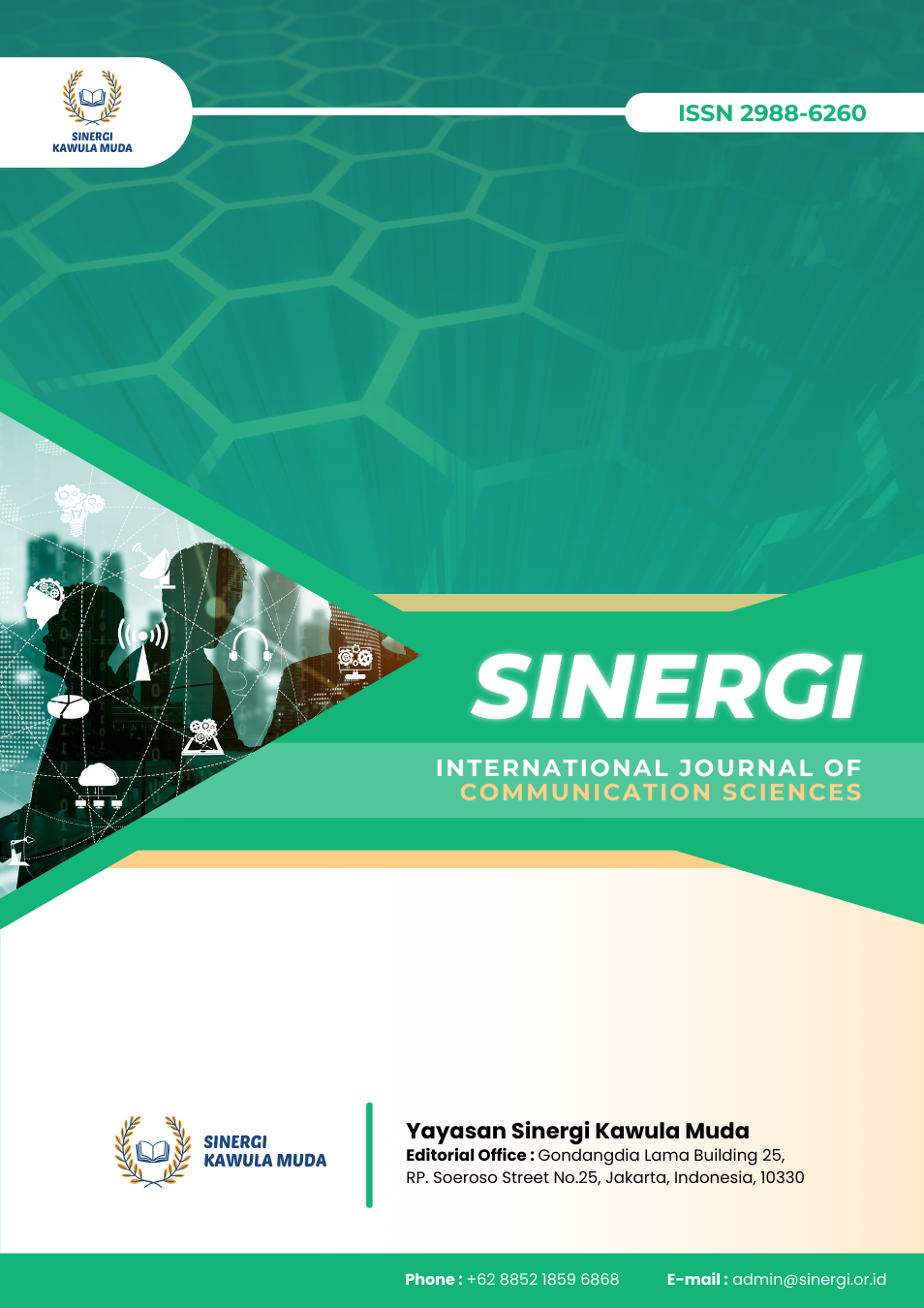Digital Transformation in Public Governance: A Narrative Review of Information Systems for Strategic Communication
DOI:
https://doi.org/10.61194/ijcs.v3i3.866Keywords:
Information Systems, Strategic Communication, Public Institutions, E-Government, Transparency, Accountability, Citizen EngagementAbstract
This study employs a narrative review approach to examine how information systems reshape strategic communication management within public institutions worldwide. Specifically, it investigates how such systems contribute to efficiency, transparency, accountability, and citizen engagement while identifying key barriers that hinder their full potential. Literature was systematically gathered from major databases including Scopus, Web of Science, PubMed, and Google Scholar, using targeted keywords such as “Information Systems,” “Strategic Communication,” “Public Institutions,” “E-Government,” “Transparency,” and “Accountability.” Studies meeting inclusion criteria consisted of peer-reviewed research with methodological clarity, focusing on outcomes relevant to public communication. Findings reveal that information systems streamline internal communication, improve productivity, and foster transparency through open data portals, enhancing trust and accountability. Platforms for e-participation and online feedback have strengthened stakeholder involvement, though effectiveness varies by region due to infrastructural, cultural, and political factors. Leadership style, human resource capacity, and organizational culture were identified as key determinants of successful adoption. Comparative evidence highlights the disparity between developed and developing regions, underscoring the importance of context-specific strategies. Despite these advances, barriers such as inadequate infrastructure, resistance to change, and limited digital literacy persist. Addressing these challenges requires investment in infrastructure, capacity-building, and supportive policy frameworks. Future research should broaden geographic representation, incorporate qualitative and longitudinal studies, and explore the role of emerging technologies. These steps are crucial for leveraging information systems to achieve more inclusive and transparent public governance.
References
Amar, N., & Romdhane, R. (2019). Organizational culture and information systems strategic alignment. Journal of Enterprise Information Management, 33(1), 95-119. https://doi.org/10.1108/jeim-03-2019-0072 DOI: https://doi.org/10.1108/JEIM-03-2019-0072
Gomes, M., & Domingues, L. (2015). The impact of a workflow system in network licensing and services radiocommunications - case study on anacom. https://doi.org/10.18803/capsi.v15.224-242 DOI: https://doi.org/10.18803/capsi.v15.224-242
Holtzhausen, D. (2016). Datafication: threat or opportunity for communication in the public sphere? Journal of Communication Management, 20(1), 21-36. https://doi.org/10.1108/jcom-12-2014-0082 DOI: https://doi.org/10.1108/JCOM-12-2014-0082
Kredina, A., Ахтанова, М., Bekturganova, M., Tsoy, A., & Spankulova, L. (2022). The relationship between logistics and information and communication technologies and their impact on the economy of Kazakhstan. Problems and Perspectives in Management, 20(4), 344-355. https://doi.org/10.21511/ppm.20(4).2022.26 DOI: https://doi.org/10.21511/ppm.20(4).2022.26
Kuczman, K., Jenei, S., Singh, D., Cseri, P., Poyda-Nosyk, N., Varga, E., … & Dávid, L. (2024). Strategic importance of corporate communication and leadership styles in the performance of Slovakian SMEs. Journal of Ecohumanism, 3(8). https://doi.org/10.62754/joe.v3i8.5432 DOI: https://doi.org/10.62754/joe.v3i8.5432
Sterlacchini, S., Bordogna, G., Cappellini, G., & Voltolina, D. (2018). Sirene: a spatial data infrastructure to enhance communities’ resilience to disaster-related emergency. International Journal of Disaster Risk Science, 9(1), 129-142. https://doi.org/10.1007/s13753-018-0160-2 DOI: https://doi.org/10.1007/s13753-018-0160-2
Ткаленко, Н., Mykhailovska, O., Marhasova, V., Garafonova, O., & Pishchenko, O. (2023). Environmental component of sustainable development of territorial communities. Financial and Credit Activity Problems of Theory and Practice, 4(51), 451-465. https://doi.org/10.55643/fcaptp.4.51.2023.4059 DOI: https://doi.org/10.55643/fcaptp.4.51.2023.4059
Tinam-isan, M., & Naga, J. (2024). Exploring the landscape of health information systems in the Philippines: a methodical analysis of features and challenges. International Journal of Computing and Digital Systems, 15(1), 225-237. https://doi.org/10.12785/ijcds/160118 DOI: https://doi.org/10.12785/ijcds/160118
Korich, F. and Fields, E. (2023). Civic engagement to empower young people to impact health and well-being. Pediatrics, 151(Supplement 1). https://doi.org/10.1542/peds.2022-057267h DOI: https://doi.org/10.1542/peds.2022-057267H
Kwan, J. (2021). ‘democracy and active citizenship are not just about the elections’: youth civic and political participation during and beyond singapore’s nine-day pandemic election (ge2020). Young, 30(3), 247-264. https://doi.org/10.1177/11033088211059595 DOI: https://doi.org/10.1177/11033088211059595
Lacharite, J. (2017). Digital media, civic literacy, and civic engagement., 44-65. https://doi.org/10.4018/978-1-5225-2463-2.ch003 DOI: https://doi.org/10.4018/978-1-5225-2463-2.ch003
Mazetti, C., Schmidt, S., Hardie, M., Boulle, J., & Parnell, S. (2022). South african urban youth responses to living in a world with covid: lessons from #slam4urlife. Gateways International Journal of Community Research and Engagement, 15(2). https://doi.org/10.5130/ijcre.v15i2.8204 DOI: https://doi.org/10.5130/ijcre.v15i2.8204
McDaniel, D. (2024). “we're loud, why aren't you?” laura’s social media activism through justice-oriented literacies. English Teaching Practice & Critique, 23(3), 368-387. https://doi.org/10.1108/etpc-12-2023-0161 DOI: https://doi.org/10.1108/ETPC-12-2023-0161
Menéndez-Blanco, M. and Bjørn, P. (2022). Designing digital participatory budgeting platforms: urban biking activism in madrid. Computer Supported Cooperative Work (Cscw), 31(4), 567-601. https://doi.org/10.1007/s10606-022-09443-6 DOI: https://doi.org/10.1007/s10606-022-09443-6
Odilla, F. and Mattoni, A. (2023). Unveiling the layers of data activism: the organising of civic innovation to fight corruption in brazil. Big Data & Society, 10(2). https://doi.org/10.1177/20539517231190078 DOI: https://doi.org/10.1177/20539517231190078
Odilla, F. and Veloso, C. (2024). Citizens and their bots that sniff corruption: using digital technology to monitor and expose politicians who misuse public money. American Behavioral Scientist. https://doi.org/10.1177/00027642241268572 DOI: https://doi.org/10.1177/00027642241268572
Papa, V. (2017). ‘to activists: please post and share your story’: renewing understandings on civic participation and the role of facebook in the indignados movement. European Journal of Communication, 32(6), 583-597. https://doi.org/10.1177/0267323117737953 DOI: https://doi.org/10.1177/0267323117737953
Sampaio, I., Robinson, L., Moles, K., & Pangrazio, L. (2024). Introduction to youth, digital media, and civic engagement. First Monday. https://doi.org/10.5210/fm.v29i12.13839 DOI: https://doi.org/10.5210/fm.v29i12.13839
Seelig, M. (2018). Social activism: engaging millennials in social causes. First Monday. https://doi.org/10.5210/fm.v23i2.8125 DOI: https://doi.org/10.5210/fm.v23i2.8125
Seelig, M. and Deng, H. (2022). Connected, but are they engaged? exploring young adults’ willingness to engage online and off-line. First Monday. https://doi.org/10.5210/fm.v27i3.11688 DOI: https://doi.org/10.5210/fm.v27i3.11688
Stornaiuolo, A. and Thomas, E. (2017). Disrupting educational inequalities through youth digital activism. Review of Research in Education, 41(1), 337-357. https://doi.org/10.3102/0091732x16687973 DOI: https://doi.org/10.3102/0091732X16687973
Vieira, D., Días, T., Sampaio, M., Pais, S., Ribeiro, N., Nada, C., … & Malafaia, C. (2024). Becoming activists: how young athletes use visual tools for civic action and meaning-making within participatory research. Frontiers in Political Science, 6. https://doi.org/10.3389/fpos.2024.1414795 DOI: https://doi.org/10.3389/fpos.2024.1414795
Vivienne, S. (2018). ‘little islands of empathy’: networked stories of gender diversity and multiple selves’. Media International Australia, 168(1), 19-30. https://doi.org/10.1177/1329878x18783019 DOI: https://doi.org/10.1177/1329878X18783019
Wood, C. (2022). Keeping receipts: lessons on civic engagement in autocratic states from kazakh advocacy for xinjiang. Central Asian Affairs, 9(1), 94-118. https://doi.org/10.30965/22142290-12340017 DOI: https://doi.org/10.30965/22142290-12340017
Zhao, X. and Abidin, C. (2023). The “fox eye” challenge trend: anti-racism work, platform affordances, and the vernacular of gesticular activism on tiktok. Social Media + Society, 9(1). https://doi.org/10.1177/20563051231157590 DOI: https://doi.org/10.1177/20563051231157590
Downloads
Published
Issue
Section
License
Copyright (c) 2025 Ajeng Iva Dwi Febriana

This work is licensed under a Creative Commons Attribution 4.0 International License.





